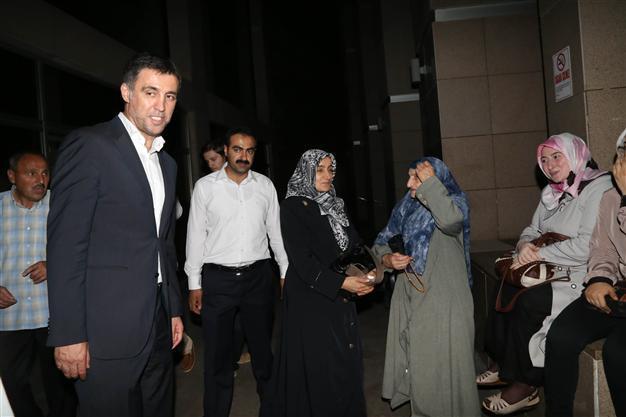Policemen in wiretapping probe lose mobile phones
ISTANBUL

Deputy Hakan Şükür visited the arrested officers in jail. AA Photo
The mobile phones of suspect police officers, who were being questioned at an Istanbul court over wiretapping claims, were confiscated on July 28.The move came following a statement by Prime Minister Recep Tayyip Erdoğan, who said after the Eid al-Fitr prayer that it was forbidden for suspects to use their mobiles during the probe. The prime minister also got into an exchange of words with Hakan Şükür, a former football star and current deputy that broke with the government over last year’s graft probe.
Some 16 detained policemen were probed until late July 27 as the questioning of 33 others more continued on Monday.
The 17th person to be probed was Yurt Atayün, the former head of the anti-terror police department in Istanbul, who had testified for 33 hours. His lawyers said the key suspect’s testimony at the court could last four or five days.
The arrested officers, including former Istanbul police intelligence chief Ali Fuat Yılmazer, were detained, along with others, on charges of illegal wiretapping in an operation launched July 23.
The latest court action follows two large anti-graft operations which were launched in December 2013 and led to the arrest of high-profile figures, including the sons of the three government ministers. All those detained in the probe were later released pending trial. The government has denounced the December probes as a “dirty plot” constructed by a “parallel structure” group of civil servants embedded within the country’s key institutions, including the judiciary and police.
Erdoğan said Şükür committed a crime by visiting the arrested officers in jail and posing for photos with them, albeit without naming the deputy by name. Şükür, a former AKP deputy, resigned after the Dec. 17 probe, before starting to criticize his old party strongly.
“I believe the judiciary will do whatever is required,” he said during a televised interview on July 27, saying this was necessary even if a deputy lends support to suspects. “They cannot do such a thing because it is putting pressure on the judiciary.”
Şükür, in turn, has published a photo of People’s Democratic Party (HDP) deputies and Abdullah Öcalan, the jailed leader of the outlawed Kurdistan Workers’ Party (PKK), together on Twitter. “So is it a crime for some deputies to have photos with suspects, while it is not a crime for some others to have photos with convicts?” he asked.
The ruling Justice and Development Party (AKP) has initiated talks with Öcalan as a part of efforts to find a peaceful solution to the Kurdish issue. The talks have involved deputies’ direct talks with Öcalan.
The families of the arrested officers, who celebrated Eid after performing prayers in front of the courthouse, called on President Abdullah Gül, Parliamentary Speaker and Constitutional Court head Haşim Kılıç to duty.
Zeliha Özlem Açıkgöz, wife of arrested officer Osman Özgür Açıkgöz, said at a press meeting that “everyone would need justice one day,” as she called on support from nongovernmental organization and political parties for support.
Mahmut Tanal, an Istanbul deputy of the main opposition Republican People’s Party (CHP), and independent deputy İdris Naim Şahin, a former interior minister from the AKP, along with some other independent deputies, also lent support to the families of the arrested policemen.
Naming the arrested officer as “heroes,” Şahin said they were captured because they conducted operations against many illegal organizations, including religious ones.
Journalist Mehmet Baransu said he was manhandled by police while entering the courthouse before taking a shelter at the Office of the Bar Association inside the building.
















